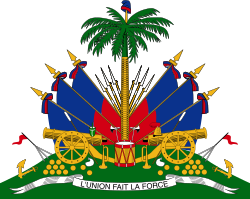16 December 1990 to 20 January 1991 | |||||||||||||||||
| Registered | 3,271,155 | ||||||||||||||||
|---|---|---|---|---|---|---|---|---|---|---|---|---|---|---|---|---|---|
| |||||||||||||||||
| |||||||||||||||||
 |
|---|
General elections were held in Haiti between 16 December 1990 and 20 January 1991. The presidential election, held on 16 December, resulted in a victory for Jean-Bertrand Aristide of the National Front for Change and Democracy (FNCD). The FNCD also won the parliamentary elections for which voter turnout was 50.8%. [1] [2] It was widely reckoned as the first honest election held in Haiti since the country declared independence in 1804.
Contents
Aristide was sworn in on 7 February [2] but was deposed in a coup eight months later.

